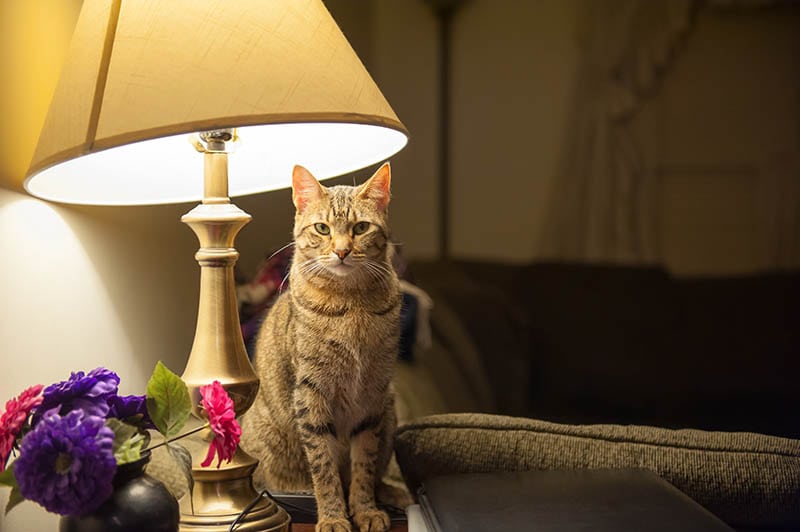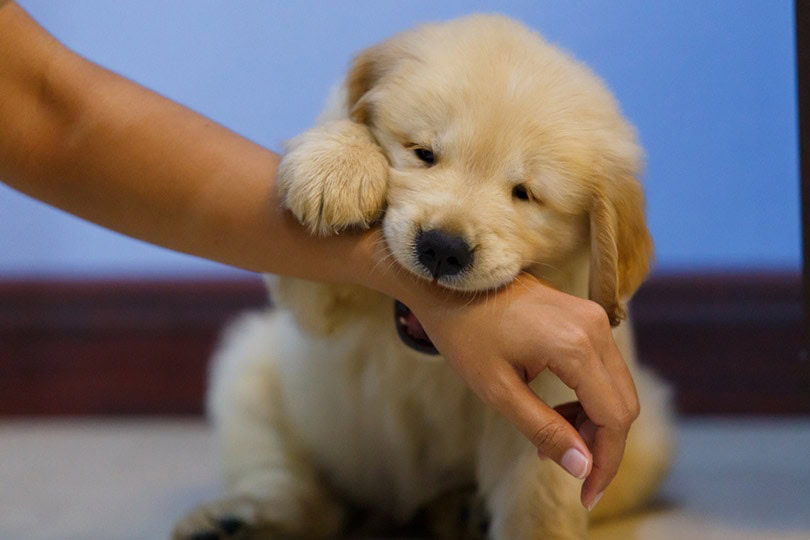VET APPROVED

The information is current and up-to-date in accordance with the latest veterinarian research.
Learn more »Click to Skip Ahead
It is not uncommon to hear cat owners talk about their cats causing a ruckus at night. Cats have different sleep patterns than humans, so it is natural for cats to be awake during certain hours of the night. However, if this behavior has grown excessive and is even keeping you awake, there could be an issue.
So, why do cats stay up at night? There are normal reasons relating to a cat’s natural instincts and behaviors, but there are also reasons that need to be attended to, such as health concerns. If you want to learn why your cat may be staying up all night, keep reading below.

Why Do Cats Stay Up at Night?
It is natural for cats to be awake during some portions of the night. Many people mistakenly believe that this is because cats are nocturnal or active at night. But in truth, cats are not nocturnal. Instead, they are crepuscular.
Crepuscular animals are most active around dawn and dusk. Your cat will have an instinct to hunt or roam around the early hours of the morning or the beginning hours of the night. So, around this time, your cat is at their most energized.
Other Reasons Your Cat May Be Staying Up at Night
Beyond instincts, there may be other reasons your cat stays up for prolonged periods. For example, if you often leave your cat home alone, they may grow bored and look for extra attention and playtime during the night. Likewise, they may sleep more often when you are not around, which will lead them to be more awake during the night.
Another reason your cat may be so active at night is hunger. Since cats tend to do most of their hunting around dawn and dusk (due to being crepuscular), they may grow hungrier around this time. If there is no food to eat, your pet may become agitated.
If your cat is a senior, that could also cause some restless nights. Many things change about our pets as they age, and sleeping patterns can be one of them. Some senior cats may suffer from cognitive dysfunction, similar to human dementia.

Health Conditions that May Cause Your Cat to Stay Up
However, before writing off your cat’s behavior as a natural thing, it is a good idea to rule out the possibility of any medical conditions. Some health concerns may contribute to a sleepless night for your cat, so check for any other signs that may indicate an illness.
Pain could be a reason that your cat is staying up so late. Cats in pain may meow or yowl excessively, have a hunched or stiff posture, improperly groom themselves, eat less, or display aggression. Another common sign of pain is an alteration to the daily routine, which may influence your cat’s sleeping patterns.
A cat with anxiety issues may also stay up throughout the night. Signs of anxiety may include hiding, changes in appetite, overgrooming, toileting outside of the litter box, and others. Similarly, a chronic illness or high blood pressure could also be the root of the issue.
Hyperthyroidism may be behind your cat’s restlessness. Other signs of hyperthyroidism include increased appetite, poor grooming, weight loss, vomiting, diarrhea, excessive drinking, and urinating. Hyperactivity is another possible sign, which could be why your cat will not rest at night.
If you suspect your cat may be suffering from an injury or illness that prevents them from sleeping, reach out to your vet as soon as possible. If you are unsure whether a medical problem could be the cause, you should still speak to your vet. Ruling out the possibility is the safest and most effective way to determine the source of your cat’s behavior.
How to Handle a Cat that Is Staying Up All Night
After ruling out a medical issue, try to determine if your cat is staying up at night due to loneliness, boredom, or hunger. If either of those possibilities are the case, you can take steps to solve those issues individually. For instance, you could get an automatic feeder, so your cat is fed a little every night, solving the hunger issue.
Daytime adjustments can reduce nighttime activity as well. Playing with your cat regularly throughout the day and ensuring their environment is enriched and stimulating is a great way to help them burn off some energy and sleep more throughout the night. Of course, while there are plenty of adjustments that you can make to help the situation, there are also some that you ought to avoid.
What Should You Avoid Doing?
If your cat is making a ruckus at night because they want attention, provide attention throughout the day, but do not indulge in their activities at night. If you do, they will only learn that they receive the desired outcome when causing trouble at night. As tempting as it may be to give in to encourage your cat to stop pestering you, the best thing you can do is be patient and guide them toward more desirable behaviors.
Likewise, you should not punish your cat. Some nighttime activity is perfectly natural for your cat, and if you punish them, you will only cause stress. The added anxiety may even make your kitty more active at night.


Conclusion
Although it is not entirely unnatural for a cat to stay up at night, there are times when it may be concerning. If the nighttime activity is caused by a medical issue, reach out to your vet immediately. Otherwise, the best thing you can do is identify the cause of the behavior and take steps to change it to something more desirable.
- See also: Why Do Cats Fake Sleep? 8 Common Reasons
- 13 Examples of Crepuscular Animals (Pictures) – Wildlife Informer
- How to Tell if a Cat Is in Pain
- The Ultimate Guide to Cat Anxiety
- Feline Chronic Disease Management | Winter Park, FL Veterinarian
- Hyperthyroidism in Cats: Symptoms and Treatment | PetMD
- Cognitive Dysfunction | Cornell University College of Veterinary Medicine
Featured Image Credit: Martin Haas, Shutterstock












